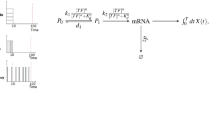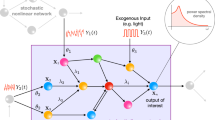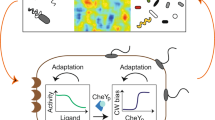Abstract
THE presence of noise in a signal transduction system usually interferes with its ability to transfer information reliably. But many nonlinear systems can use noise to enhance performance1, and this phenomenon, called stochastic resonance, may underlie the extraordinary ability of some biological systems to detect and amplify small signals in noisy environments2–5. Previous work has demonstrated the occurrence of stochastic resonance in a complex system of biological transducers and neural signal pathways6, but the possibility that it could occur at the sub-cellular level has remained open. Here we report the observation of stochastic resonance in a system of voltage-dependent ion channels formed by the peptide alamethicin. A hundred-fold increase in signal transduction induced by external noise is accompanied by a growth in the output signal-to-noise ratio. The system of ion channels considered here represents the simplest biological system yet known to exhibit stochastic resonance.
This is a preview of subscription content, access via your institution
Access options
Subscribe to this journal
Receive 51 print issues and online access
$199.00 per year
only $3.90 per issue
Buy this article
- Purchase on Springer Link
- Instant access to full article PDF
Prices may be subject to local taxes which are calculated during checkout
Similar content being viewed by others
References
Wiesenfeld, K. & Moss, F. Nature 373, 33–36 (1995).
Block, S. M. in Sensory Transduction 1–17 (Rockefeller Univ. Press, New York, 1992).
Polk, C. in Proc. 13th A. Meeting Nat. Council Radiat. Protection & Measmnt (National Council on Radiation Protection, Washington DC, in the press).
Kalmijn, A. D. Science 218, 916–918 (1982).
Bulsara, A. R., Lowen, S. B. & Rees, C. D. Phys. Rev. E49, 4989–5000 (1994).
Douglass, J. L., Wilkens, L., Pantazelou, E. & Moss, F. Nature 365, 337–340 (1993).
Hille, B. Ionic Channels of Excitable Membranes (Sinauer Associates Inc., Sunderland, MA, 1992).
Makeev, V. M. Biofisika 38, 189–195 (1993).
Petracchi, D., Pellegrini, M., Pellegrino, M., Barbi, M. & Moss, F. Biophys. J. 66, 1844–1852 (1994).
Pantazelou, E., Dames, C., Moss, F., Douglass, J. & Wilkens, L. Int. J. Bifurc. Chaos 5, 101–108 (1995).
Hall, J. E., Vodyanoy, I., Balasubramanian, T. M. & Marshall, G. R. Biophys. J. 45, 233–247 (1984).
Eisenberg, M., Hall, J. E. & Mead, C. A. J. Membrane Biol. 14, 143–176 (1973).
Collins, J. J., Chow, C. C. & Imhoff, T. T. Nature 376, 236–238 (1995).
Bezrukov, S. M. & Vodyanoy, I. Biophys. J. 64, 16–25 (1993).
Author information
Authors and Affiliations
Rights and permissions
About this article
Cite this article
Bezrukov, S., Vodyanoy, I. Noise-induced enhancement of signal transduction across voltage-dependent ion channels. Nature 378, 362–364 (1995). https://doi.org/10.1038/378362a0
Received:
Accepted:
Published:
Issue Date:
DOI: https://doi.org/10.1038/378362a0
This article is cited by
-
Stochastic resonance in 2D materials based memristors
npj 2D Materials and Applications (2024)
-
Leveraging plant physiological dynamics using physical reservoir computing
Scientific Reports (2022)
-
How synaptic plasticity affects the stochastic resonance in a modular neuronal network
Nonlinear Dynamics (2022)
-
Stochastic resonance in MoS2 photodetector
Nature Communications (2020)
-
Inverse stochastic resonance in Hodgkin–Huxley neural system driven by Gaussian and non-Gaussian colored noises
Nonlinear Dynamics (2020)
Comments
By submitting a comment you agree to abide by our Terms and Community Guidelines. If you find something abusive or that does not comply with our terms or guidelines please flag it as inappropriate.



